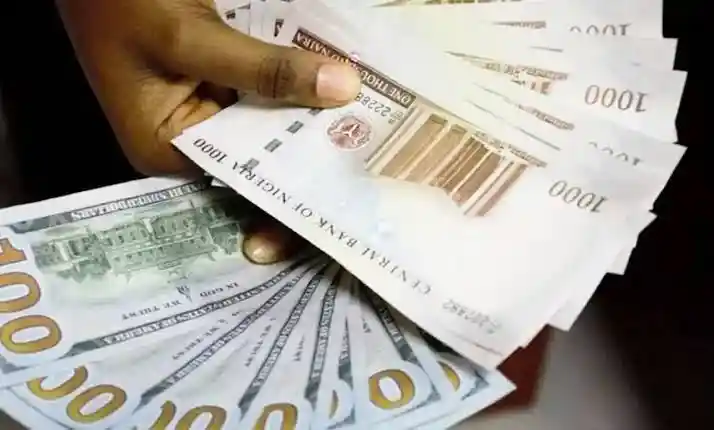The Nigerian currency, the Naira, has continued to face fluctuations against the United States Dollar (USD), with traders and consumers closely monitoring both official and parallel market rates.
TJ News Nigeria reports that as of Tuesday, August 26, 2025, the Naira exchanged at an average rate of ₦1,534.03 per US Dollar in the official foreign exchange market, while the parallel market recorded an average of ₦1,540 per Dollar.
Official Dollar to Naira Exchange Rate Today
Data obtained from the Mid-Forex monitoring platform shows that the official rate at the Investors’ and Exporters’ (I&E) window closed at ₦1,534.03/$1. This represents a marginal shift from the previous day’s close, reflecting ongoing volatility in the Nigerian foreign exchange market.
The official window remains the benchmark for businesses, importers, and investors, though access to forex at this rate has often been limited compared to demand.
Parallel Market (Black Market) Dollar to Naira Rate
In the parallel market, also known as the black market, the exchange rate stood at ₦1,540 per Dollar. This rate is usually determined by demand and supply dynamics outside the official banking system and is often higher than the official rate.
Currency traders in Lagos, Abuja, and Port Harcourt confirmed that the rate has remained within the ₦1,535 – ₦1,545 band in the last 48 hours, as demand for dollars continues to outpace supply.
Comparison of Rates
| Market Type | Rate (₦ per $1) |
|---|---|
| Official (I&E Window) | ₦1,534.03 |
| Parallel Market | ₦1,540 |
The small difference between the official and black-market rates shows a relatively narrow gap compared to previous months, but concerns remain about long-term currency stability.
Government’s Position on Forex Stability
The Federal Government, through the Central Bank of Nigeria (CBN), has repeatedly emphasized its commitment to stabilizing the Naira. Recent monetary policies include:
- Increasing dollar supply to banks and Bureau De Change operators.
- Encouraging foreign remittances through formal banking channels.
- Monitoring unauthorized forex dealers to curb illegal transactions.
Financial analysts, however, note that without a significant boost in Nigeria’s foreign reserves, the Naira will remain under pressure against the Dollar.
Why the Naira Keeps Falling
Several factors contribute to the persistent depreciation of the Naira against the Dollar:
- High Import Dependency – Nigeria imports large volumes of goods, creating constant demand for foreign currency.
- Declining Oil Revenues – Crude oil, Nigeria’s main foreign exchange earner, has faced fluctuating global prices.
- Low Foreign Investment – Uncertainty in the economy has reduced foreign portfolio and direct investment inflows.
- Inflation and Interest Rates – Rising inflation puts additional strain on the Naira, as the cost of goods and services continues to rise.
- Speculation – Many individuals and businesses buy and hold dollars as a hedge against further Naira depreciation.
Dollar to Naira: Historical Trends in August 2025
- August 1, 2025: ₦1,498 (official) / ₦1,505 (parallel)
- August 15, 2025: ₦1,526 (official) / ₦1,532 (parallel)
- August 26, 2025: ₦1,534 (official) / ₦1,540 (parallel)
This data shows a steady weakening of the Naira throughout August, with analysts predicting further pressure in the coming weeks unless key economic reforms take effect.
Implications for Nigerians
The continued depreciation of the Naira has direct impacts on everyday life:
- Cost of Goods: Imported items such as electronics, fuel, and food products rise in price.
- Tuition Fees Abroad: Students studying outside Nigeria face higher tuition and living costs when converting from Naira.
- Businesses: Import-dependent businesses struggle to remain profitable, often passing costs to consumers.
- Inflation: The weakening currency contributes to overall inflation, reducing the purchasing power of households.
Expert Outlook
Economic experts warn that unless Nigeria diversifies its economy and reduces dependence on oil revenues, the Naira may continue to struggle. Strengthening local production, boosting exports, and attracting foreign investments are seen as key solutions.
Some analysts also predict that the Central Bank may have to consider additional interventions, including possible interest rate adjustments, to stabilize the currency.
Key Takeaway
As of Tuesday, August 26, 2025, the Dollar to Naira exchange rate stands at ₦1,534 (official) and ₦1,540 (parallel market). While the gap between both markets is narrower compared to previous months, Nigeria’s forex challenges remain unresolved.
The situation underscores the need for stronger economic policies, diversification, and renewed confidence in the Nigerian financial system to stabilize the Naira in the long term.
